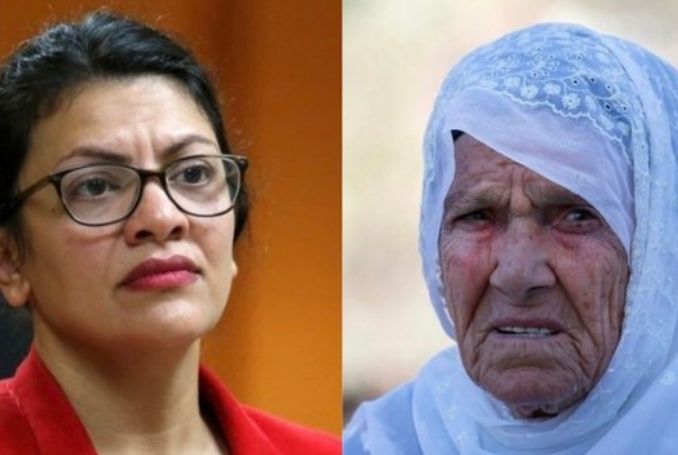
The Palestinian grandmother of Rashida Tlaib said she was proud of her granddaughter’s pro-Palestine stance after the US Congresswoman was barred from traveling to Israel.
Muftiyah Tlaib, who lives in the family’s village of Beit Ur Al-Foqa in the occupied West Bank, told the Washington Post:
“Who wouldn’t be proud of a granddaughter like that? I love her and am so proud of her.”
#MyPalestinianSitty trends as Palestinians share their "sitty" stories in honour of US congresswoman @RashidaTlaib's grandmother. https://t.co/U4QpTSBTqp
— Al Jazeera English (@AJEnglish) August 18, 2019
She had initially criticized Tlaib’s inability to freely visit despite being a US lawmaker.
“She’s in a big position and she cannot visit her grandmother. So what good is the position?” she said.
On Thursday, Israel barred from entering the US Congress’ first Muslim female lawmakers, Tlaib and Ilhan Omar, on the grounds that they support the boycott movement, and after President Donald Trump urged the Jewish state to block the two Democrats.
#MyPalestinianSitty is trending on Twitter as Palestinian users celebrate the strength and resilience of their grandmothers in solidarity with Rashida Tlaib, who Israel barred from visiting her grandmother in the occupied West Bank. https://t.co/lHm5x3Fi2l pic.twitter.com/cmGTA4yxTC
— The IMEU (@theIMEU) August 18, 2019
But it held out the carrot of allowing Tlaib to make a private visit to her elderly grandmother if she agreed to abide by conditions including a pledge not to advocate boycotting Israel.
She initially wrote:
“This could be my last opportunity to see her. I will respect any restrictions and will not promote boycotts against Israel during my visit.”
#MyPalestinianSitty Teta Farha in Ramallah around 1925; sadly she died shortly after this photo was taken. My step grandmother, Teta Zareefeh, lovingly raised all nine of her children. She died in 1967 during the war. Palestinian women are truly the salt of the earth. pic.twitter.com/Zk6iBIV6QZ
— Hanan Ashrawi (@DrHananAshrawi) August 18, 2019
On Friday, Israel’s Interior Minister Aryeh Deri announced that she would be permitted a “humanitarian visit”, but a few hours later Tlaib announced a change of heart.
She wrote in a series of tweets:
“I have decided that visiting my grandmother under these oppressive conditions stands against everything I believe in – fighting against racism, oppression & injustice.”
“When I won, it gave the Palestinian people hope that someone will finally speak the truth about the inhumane conditions,” added the 43-year-old congresswoman, elected in January.
#MyPalestinianSitty My sitty was born in 1933 in Chnaysa, Palestine which is now barren land after being confiscated when the state of Israel was created. Lived in US for decades, but her love for her land and country brought her back to Palestine. Look at that smile! pic.twitter.com/SH5GMyMWUd
— Nihaya Mizyed (@nihayamizyed) August 18, 2019
“I can’t allow the State of Israel to take away that light by humiliating me & use my love for my sity to bow down to their oppressive & racist policies,” she said, using the Arabic word “sity” to refer to her grandmother.
“Silencing me & treating me like a criminal is not what she wants for me. It would kill a piece of me.”
Palestinian activists had been urging Tlaib on social media not to visit her grandmother under the Israeli terms.
Tlaib’s decision not to visit prompted many to support her on social media platforms, using the hashtag #MyPalestinianSitty to share images of their grandmothers in Palestine.
(Al-Araby Al-Jadeed, PC, Social Media)







